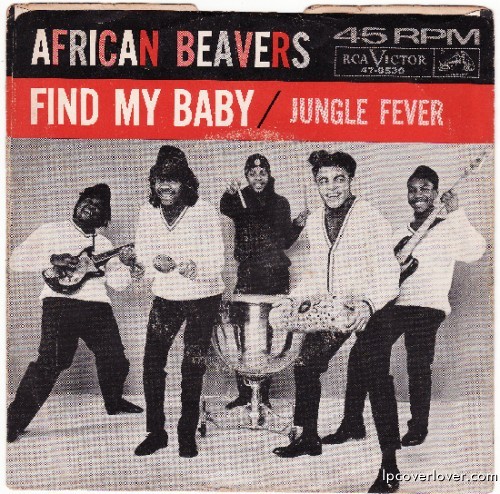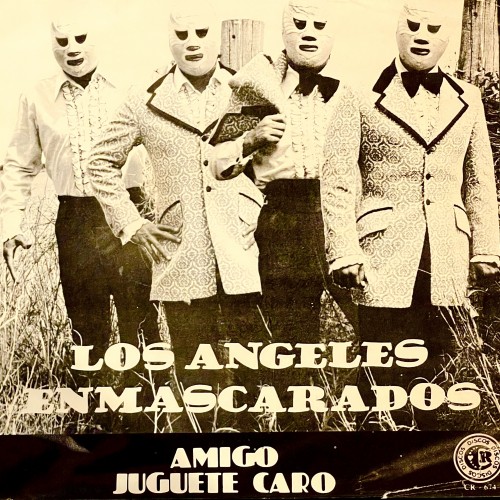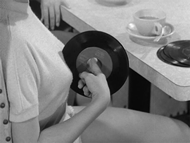Who are the African Beavers?

African Beavers “Find My Baby” / “Jungle Fever” RCA Records
Here’s a great story found at The Further Adventures of Boogaloo Omnibus of a lost and mysterious record. Thanks to our friend Tim at the always edutaining Stupefaction for sending it in:
Around 1980, while attending a late night record listening party at the house of Dave and Phil Alvin of The Blasters, a record by The African Beavers was played. At the time it was suggested that the record was recorded by The Isley Brothers with Jimi Hendrix playing guitar under an assumed name—and, indeed, this is what the record sounds like. The lead singer hits high falsetto notes that sound a lot like the singing of Ronald Isley. For a soul record, the production is sparse. There are no horns, only guitar bass and drums—much like a rock group. The playing of the guitarist, however, is sufficiently forward-looking to sound not unlike the work of Jimi Hendrix during this period, 1964-1965.
This was a revelation.
For years, I thought that this was certainly an Isley/Hendrix collaboration; one that no one was talking about as it appeared in no books about Jimi Hendrix (unfortunately, there are no books about The Isley Brothers—a shame, considering that the group had a LOT more longevity and success than Hendrix).
Anyway, I duly went out and found copies of both records by The African Beavers: Jungle Fever/Find My Baby (RCA 47-8530) and Night Time is the Right Time/You Got Something (RCA 47-8639). The more I listened to them, the more I thought that these are Isley/Hendrix recordings.
During the nineties, I met a fellow who had access to the RCA vaults. I asked him if he could find information on these records. All he found out was that the tracks were licensed from an independent record label/production company called Gwen Records out of New Jersey (blues singer Buster Brown cut a single for Gwen in 1963).
Further research turned up this: Buster Brown’s real name is Wayman Glasco, who is credited to have written the two original African Beavers songs. Glasco must have been in the band, or acted as a producer/Svengali of some sort. Perhaps he was an owner of Gwen Records, but he seems to have been involved somehow. Buster Brown, who had a Number One R&B hit with “Fannie Mae†in 1960, was a fine blues harmonica player, yet there is no harmonica playing on the records by The African Beavers.
Nothing else.
In 2001, I had the opportunity to interview Ronald and Ernie Isley. By the end of the interview I mustered up enough courage to ask them about The African Beavers. They denied any knowledge of the records. At this late date, they have no reason to lie about such a session, if it really took place, so I believe them.
So that was all we knew about The African Beavers—until last month, when a picture sleeve for the first single surfaced at a record show in Wayne, NJ. The dealer wanted a little bit of change for it, so, even though I held it in my hands and slobbered on it, I didn’t buy it. For a month I regretted that decision. When it came time for the August Wayne, NJ record show, I went and bought it! – Boogaloo Omnibus




 (52 votes, average: 3.67 out of 5)
(52 votes, average: 3.67 out of 5)







August 21st, 2010 at 8:10 am
Check out my post here:
http://indangerousrhythm.blogspot.com/2006/01/african-beavers-find-my-baby-rca.html
Cheers
Colin
October 19th, 2010 at 11:25 am
Can you help me find more about this group? My dad is the light skin guy with the funny instrument. Was his alias Larry Hale? Who is Tony Fox saying the other singer on the record was???
February 8th, 2016 at 6:20 am
I found what I was looking for. James Earnest Mitchum was not Larry Hale, Tony Fox or Larry Cappale… I was confused by Tony Fox claiming to be the voice on the records. Tony Fox was never on those particular records, hence not being on the record cover. Those men were from Georgia I have at least 4 names, one of which is still living. My Father is the lead singer on Night Time is The Right Time. He was around 19 years old. The younger voices are his. The older voice is not. I’m really happy to learn more about him. I am continously searching.
December 19th, 2017 at 11:32 am
This is very interesting, i play with a man named Robert Lee Coleman and he asked me to look this up cause his brother (Calvin Coleman) is the guitar player on this record and his friend Albert Murphy ,who was in the band too , told him that the record was online. I asked Robert who else was in the band , and he could only remember James Mitchell so far. Were from Macon, Georgia and Robert is still here playing and Murph too!
December 20th, 2017 at 4:36 pm
Wyatt Pyles, thanks for responding! James Mitchum is his name. My mother and Newton Collier told me about Alfred Murphy and Calvin Coleman. Yes the men on the record are from Georgia. My dad is buried in Macon Ga. Call me at 478-202-0749 I’d like to know more.
January 22nd, 2021 at 5:00 pm
Hey Buddy,
Your father and the band was one of the greatest inspirations of my life.
The band had a full length LP too, which was great from start to finish. The band was fun, playful, and talented. I loved the hit single and had the picture sleeve.
The LP cover is different, and was in colour.
What seems to be lost to history in some circles is the authenticity of good music, fun music, played honestly. The African Beavers were a band whose music went beyond the easy confines of genre or playlist style. Their music sang to the heart of a child, a young person who could be lifted up by the enthusiasm and joy of their music, and could inspire a dancer’s feet and hips.
As a guitarist, wow this was good stuff. But let’s be real – it was the level of damn good that any band who played clubs and had a major label deal needed to be. The guitar style is adventurous, in the pocket, and steadily within the tradition of great dance bands that could be enjoyed as a listener. It is young and free.
The Afro American tradition of say, early Motown, went beyond the Afro American areas of Detroit. So did the music of the African Beavers. Their music was genuine, competent, passionate, and freely inspired. It approached a blues based RnB/pop. The synthesis was and is excellent.
It won’t be easy, but maybe it will, but get as many copies of their LP as you can because you will wear those LPs out from over play. You will wear out the grooves.
It is unfair to ask a musician about their past or why they do things. Because self reflection is not a dominant trait when musicians are young, they often react to their early work as if it is somehow less than who they see themselves as later in life.
For many musicians, they will lie or not speak of music that they burned out on – or were burned for.
Pick a band, any successful band or artist, and this is common. When I listen to my early work by necessity, for instance, I cringe even though I know some folks would love the older music I did way more than what I do now. But for me, like anyone with a long history of playing in bands, writing music, singing in clubs, I hear the context of the music, the song, as it was in my life, and the journey the song or recording had with me. It is not easy because a lot of water passes under the bridge, much of it painful to various degrees, and onward the reaction goes until self acceptance can be genuine.
This is why some artists make up stories to tell in interviews and tell them over and over…it is to save themselves from their own internal critic and not reexperience the moods or feelings associated to a song in their subjective experience.
Sending my respect to you, and your father’s memory. Please know his music touched many and was loved.